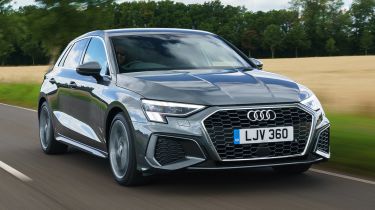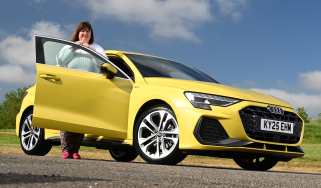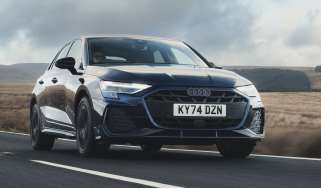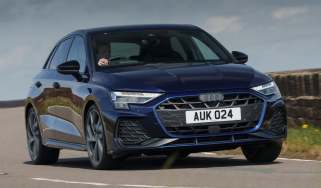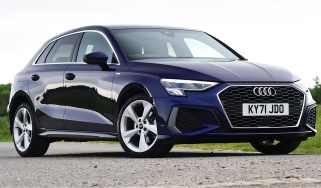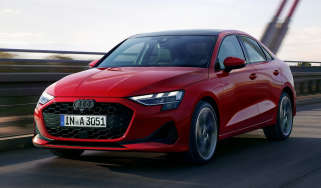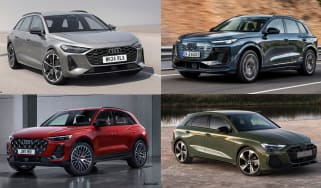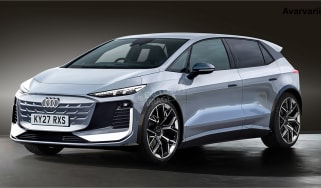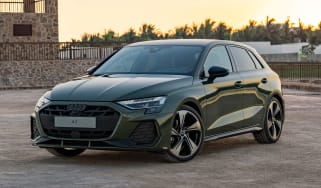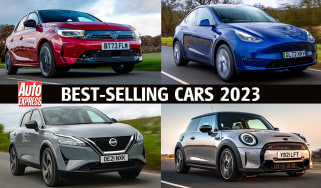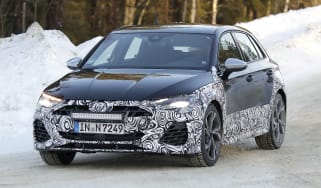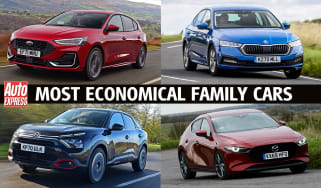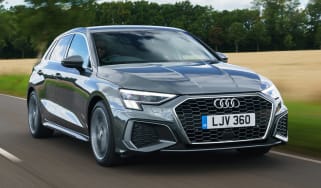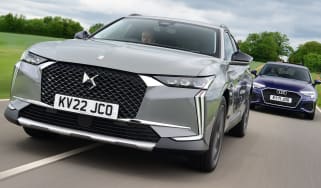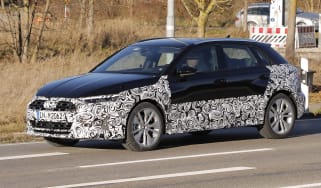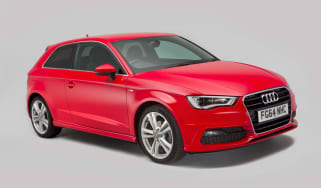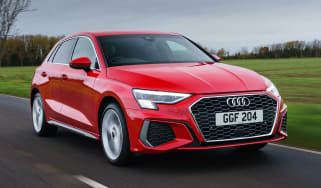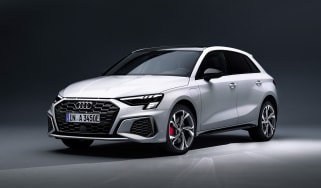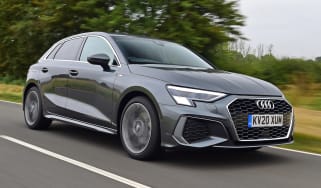Audi A3 review
Subtle exterior design and a tech-laden interior help the Audi A3 maintain its position as a premium family hatchback
Even though the latest Audi A3 looks familiar, its sharper exterior lines and slightly larger footprint only accentuate the premium look of the stylish family hatchback.
Where the German manufacturer has made decisive change is with the on-board tech and interior design, offering an up-to-date digital environment with the typical Audi focus on quality materials throughout the cabin. The A3 remains as desirable as ever, but will still have its work cut out to win customers away from the equally capable Mercedes, BMW and Volkswagen rivals.
About the Audi A3
The A3 has been around since 1996 when Audi decided to produce a premium hatchback to deal with the oncoming threat of the first-generation Mercedes A-Class. The debut Audi A3 model cleverly used the reliable underpinnings from its Mk4 Volkswagen Golf stablemate, and with its polished good looks, sophisticated style and superb build quality, it quickly established itself as a leader in the premium hatchback class.
Now in its fourth generation, the A3 continues to mix it amongst the best, even though the high-end hatchback sector also includes the likes of the BMW 1 Series. The latest A3 still utilises a shared platform – this time the Volkswagen Group’s MQB platform – with the cheaper Golf, SEAT Leon and Skoda Octavia. The Audi variant differs from the others by offering big-car luxury and a desirable appeal that others still find hard to match.
Used - available now
Priced from just over £27,000, Audi offers the A3 as a five-door Sportback or a four-door Saloon model, with no room for a three-door hatch or Cabriolet version in the range.
There are three equipment levels for regular petrol and diesel for both the Sportback and Saloon variants: Sport, S line and Black Edition. If you chose the TFSIe plug-in hybrid, then it only comes in the Sportback body style and the trim levels differ slightly; Sport and S line still feature, but the most powerful 45 TFSIe model comes exclusively in S line Competition form. The hotter S3 comes in Black Edition and Vorsprung trims, while the RS 3 comes in standard, Carbon Black, and Vorsprung trim levels.
Petrol power comes in the form of either a 1.0-litre unit with 109bhp, badged 30 TFSI, or a 1.5-litre engine with 148bhp, labelled 35 TFSI. The diesel range has also been pared back to a single oilburning option: the 148bhp 35 TDI.
Plug-in hybrid power is offered in the form of the Sportback TFSI e model, available with Sport, S line and S line Competition trim levels. A 1.4-litre petrol engine and an electric motor combine to produce either 201bhp in 40 TFSI e specification, or 242bhp in the 45 TFSI e model.
The performance end of the range is taken care of by the 306bhp S3 and 394bhp RS 3, with both available in either Sportback or Saloon body styles. The S3 generates its power via a 2.0-litre petrol engine, while its brawny RS 3 sibling uses a 2.5-litre five-cylinder unit. Quattro four-wheel-drive is standard for both.
Engines, performance and drive
The current A3 range is offered with a choice of two petrol engines or a diesel. The petrol options were either a 109bhp 1.0-litre (30 TFSI), a 148bhp 1.5-litre (35 TFSI), with the 1.5-litre employing a 48-volt mild hybrid system, which helps to save fuel and supplies an extra 50Nm of electrically-generated torque.
With the move towards electric power and diesel-engined models becoming less sought after, the decision to trim out the drop the 114bhp 30 TDI and 197bhp 40 TDI models from the A3 range was inevitable. This leaves just the 148bhp 35 TDI as the sole oil-burner in the lineup. We’ve driven the 35 TDI and found it a hard engine to fault, thanks to strong torque delivery and excellent refinement, even under hard acceleration.
We feel sure the petrol A3 35 TFSI model will prove to be a popular choice, and it also benefits from Audi’s decision to offer a more sophisticated multi-link rear suspension, rather than the simpler torsion beam set-up of lower-spec cars. Audi has wisely chosen to keep the A3’s driving dynamics unchanged, resulting in a family hatchback that provides a great mix of comfort and control, although the S line versions still err towards a firmer ride.
If you want a bit more steering feel, we’d recommend toggling through the drive select modes to the Dynamic setting, which provides a bit more weight to the naturally light set-up. Equally, the six-speed manual ‘box has a light throw and is easy enough to get along with, although the transmission is prone to low-speed jerkiness, making driving around town in stop-start traffic harder than it needs to be. The plug-in hybrid TFSI e model also struggles, because the transition from electric to engine power isn’t as smooth as it should be. This model is also lumbered with a weighty battery pack contributing to a more unsettled ride than the standard A3.
The high-performance RS 3 is much more satisfying to drive, thanks in no small part to its trick four-wheel drive system and clever rear differential that can shuffle the engine’s power around to maximise traction. It all makes this a devastatingly quick cross-country weapon. Like the Mercedes AMG A45, the RS 3 can shuffle much of its power back to the rear wheels, making it a much more dynamic car. However, in our comparison test between an Audi RS 3 and a Mercedes-AMG A 45 S, we found the Mercedes to have the edge regarding sharpness and ultimate driver involvement.
0-62mph acceleration and top speed
The sporty S3 and RS 3 models will provide the real performance thrills, but the lower-powered petrol and diesel versions in the A3 range still deliver enough shove for most drivers.
The entry-level 1.0-litre 30 TFSI petrol model has 109bhp and 200Nm of torque, enabling it to reach 0-62mph in 10.6 seconds and onto a 127mph maximum.
Those looking for an extra power boost could consider the 1.5-litre 35 TFSI petrol unit with 148bhp and an extra 50Nm of torque over the base 30 TFSI car. It’ll accelerate from 0-62mph in a lively 8.4 seconds, while the top speed increases to 139mph.
The sole 35 TDI diesel offering has a stout 148bhp output, but the 360Nm of torque on offer makes for decent acceleration and easier overtaking when on the motorway. Like the 35 TFSI, it’ll get to 62mph in a highly respectable 8.4 seconds.
Keen drivers with cash to spare will be in awe of the sprinting ability on offer from the S3 and RS 3 models: the former is capable of 0-62mph in 4.8 seconds, while the latter car's 394bhp knocks a full second off this time – plus it emits a glorious five-cylinder howl whilst doing it.
Heading back down to Earth, we find the pair of plug-in hybrid models. The 201bhp 40 TFSI e will crack the 0-62mph sprint in 7.6 seconds, while the 242bhp 45 TFSI e reduces this further to 6.8 seconds.
MPG, CO2 and running costs
Audi has progressively developed the A3 range to now include petrol, diesel and plug-in hybrid engines, delivering competitive running costs and low emissions.
The 30 TFSI petrol unit, with a six-speed manual ‘box, returns an impressive maximum of 51.4mpg and emits 124g/km of CO2, while the 35 TFSI manages a creditable 47.9mpg and CO2 emissions of 133g/km. The 35 TFSI seven-speed S tronic auto is actually more efficient than the manual version, delivering 49.6mpg and 129g/km of CO2.
Company car drivers will be attracted by the A3 TFSI e models, which offer lower CO2 emissions and a reduced benefit-in-kind tax rating compared with a petrol or diesel alternative. The version to go for is a 40 TFSI e Sport or an S line with the smaller 17-inch wheel option, because then it’ll sit in a lower BiK band due to having a claimed electric range of up to 40 miles. A regular 40 TFSI e on standard 18-inch wheels has a 38-mile range, while the 45 TFSI e gets a figure of 37 miles. Higher mileage drivers should consider the 35 TDI diesel, which offers a claimed 61.4mpg and 120g/km of CO2.
Buyers looking towards the performance S3 and RS 3 models, probably won't be overly concerned with overall efficiency, although the S3 still manages a decent 34.9mpg on the combined cycle. The more powerful RS 3 predictably fares a little worse, returning an average of 31.4mpg.
Both the 40 and 45 TFSI e have a 13kWh (10.4kWh useable) battery pack, similar to what you’ll find in the Peugeot 308 Hybrid. Unlike the Peugeot, the A3 takes a lengthy four hours to fully recharge because it only accepts up to 3.6kW charging, whereas the 308 takes a mere two because it can take full advantage of the 7kW charging provided by most home wallbox chargers.
Insurance groups
The petrol-engined A3 versions sit in insurance groups 15-22, with diesel cars in groups 21-23, depending upon the trim level. By comparison, an entry-level Mercedes A 180 petrol in Sport Executive trim starts in group 19, while an A 200 diesel in the same trim begins from group 23. The standalone S3 and RS 3 models are in groups 32 and 35, respectively.
Depreciation
Our expert data suggests that the A3 will retain between 40 to 49 per cent of its original value over three years and 36,000 miles, which is on par with the BMW 1 Series and the Mercedes A-Class over the same period.
To get an accurate valuation on a specific model check out our Free Car Valuation tool...
Interior, design and technology
Following the success of the previous third-generation model, Audi hasn’t sought to conjure up a radically different exterior for the A3. Instead, the design progresses the Audi family look with the large honeycomb front grille, alongside more aggressive side vents and angular LED headlights.
There are prominent crease lines set low along the doors, and the rear end is totally new – but the overall effect is still unmistakably an A3.
It’s inside the cabin of the A3 where Audi has clearly focused much of its attention. The dash is full of angles and is not so conservative as in the previous model, while the fascia is now trimmed in faux aluminium – still of typical Audi quality, but a definite change in stylistic direction.
Standard equipment levels are good, with entry-level Sport specification bringing 17-inch alloys, LED headlights, dual-zone climate control, a 10.1-inch central touchscreen with sat-nav, cruise control, and rear parking sensors.
Moving further up the range brings progressively larger wheels, sports seats, enhanced leather upholstery, privacy glass and a flat-bottomed sports steering wheel, as well as a black styling pack.
Sat-nav, stereo and infotainment
There has been a far-reaching swing to a more digital driving environment in the A3. Every version now gets a standard 10.25-inch Virtual Cockpit digital instrument panel, along with a 10.1-inch central touchscreen.
The infotainment system is a known quantity, given its application across most of the Audi line-up. It’s a little slow to load when you start up, but it is pinpoint sharp in presentation and feature-packed, while standard wired Android Auto and wireless Apple CarPlay allow you to use apps from your phone. It’s a real slice of big-car tech in a compact hatchback. Our only bugbear is that it relies solely on touch inputs, with no MMI rotary dial or other controls for ease of use on the move.
The standard audio system is a six-speaker set-up, but those wanting a richer sound experience should look at the Technology Pack. It adds an excellent 680-watt, 15-speaker Bang and Olufsen sound system and provides you with a wireless phone charging pad.
Practicality, comfort and boot space
With no three-door or convertible models available, the Audi A3 range consists of the more practical five-door Sportback and the four-door Saloon versions that’ll fit better with family life.
The Audi A3 has always provided premium levels of comfort. The seats are comfortable, and all versions come with four-way electrically adjustable lumbar support in order to fine tune the driving position. The cabin is well insulated from road noise, making the A3 a particularly refined place to be on longer trips.
The lack of wind noise and impressive mpg figures have been helped by the introduction of movable air inlets and a smoother underbody, which help to improve the airflow and reduce fuel-sapping aerodynamic drag.
Specifying a car in Sport trim or above brings a useful split-folding rear bench seat – folding fully, or in a 40:20:40 configuration. It also includes a centre armrest with cup holders.
Dimensions and size
The A3 is 4,343mm long, 1,984mm wide (including mirrors) and stands 1,425 tall. The Mercedes A-Class is a little longer at 4,445mm, slightly wider at 1,992mm, but has a lower roofline with an overall height of 1,412mm.
Leg room, head room & passenger space
The fourth-generation A3 is slightly longer and wider than its predecessor, and this brings the advantages of increased head and legroom throughout the cabin. Four passengers can sit comfortably, with the rear middle seat best used for shorter journeys.
Two ISOFIX points are provided on the rear bench's outer positions, and you can add another child seat anchor point on the front passenger seat for free.
Boot space
Storage space for the A3 is pretty decent – the Sportback model offers 380 litres of load capacity with all the seats in place, while the boot is well-designed with a wide opening and no awkward lip to get luggage over. This does reduce to 280 litres if you choose either of the plug-in hybrid models, because the boot floor has had to be raised to accommodate the battery pack.
The A3 Saloon has a 425-litre boot, which is five litres up on the four-door A-Class.
Towing
The A3 30 TFSI petrol model has a maximum trailer weight limit of 1,300kg (at 12 per cent gradient), while the 35 TFSI has a 1,500kg limit. The 35 TDI diesel is rated to tow 1,600kg (at a 12 per cent gradient).
Reliability and safety
As a brand, Audi has slipped down the rankings, dropping from 22nd in our 2022 Driver Power customer satisfaction survey, to 30th out of 32 manufacturers. This is disappointing because there were signs of improvement, but it’s once again heading down the table, finishing below arch-rivals Mercedes and BMW.
Euro NCAP has awarded the A3 a full five-star rating back in 2020, with an 89 per cent score for adult protection and 81 per cent for child occupant safety. It is a little odd that its siblings, the Cupra Leon and Seat Leon upon which the A3 is based, managed to score better than the A3 in all disciplines, though.
All A3 versions include Audi’s ‘Pre Sense Front’ safety system, which uses a radar-based warning to alert the driver to potential hazards. It also can initiate automatic emergency braking if required at low speeds to either avoid or mitigate collisions with other vehicles and vulnerable road users. The on-board safety kit adds a lane departure warning system, cruise control and rear parking sensors.
Warranty
Audi’s standard warranty is three years and up to 60,000 miles, which can’t match the three-year/unlimited mileage policies of BMW or Mercedes. You can upgrade to a four or five-year warranty for an extra fee.
The battery pack in plug-in hybrid models comes with a separate eight-year/100,000 miles warranty that guarantees the capacity won’t drop below 70 per cent over that period.
Servicing
Service intervals are set for every two years or 18,000 miles, whichever comes first. That may reduce if you do a lot of stop/start driving in town.
Service plans are available for cars under three years old that cover two consecutive services, and depend upon the engine size (and exclude S and RS models). Vehicles with engines under 2.0 litres cost either £650 upfront or around £28 per month, while those with bigger engines cost around £780 upfront, or about £33 per month.
Used and nearly new Audi A3
In production since 1996, the first-generation A3 hatchback delivered typical Audi build quality and a premium fit and finish that proved to be a winning combination with buyers. Originally only offered as a sporty three-door model, the more practical five-door version arrived in 1999 to equal success.
Moving through four generations over 25 years means there will be a host of used examples on the market, with petrol, diesel and more recently plug-in hybrid power available. Sport and S line cars offer improved equipment and a stronger exterior look, although if you're able to bag a solid car with good history then, whatever model you go for, you'll have a classy, refined family hatchback.
Audi A3 history
Audi A3 Mk3: 2012-2020
With the Mk4 A3 model range now fully on sale, later cars from the Mk3 generation could prove to be a smart buy. The A3 generally holds its value pretty well, but sourcing a car from the previous lineup that's perhaps 3-4 years old might be the sweet spot in terms of value for money.
The Mk3 A3 was facelifted in 2016 and, along with some styling tweaks and a couple of new petrol engines, received the option of a Virtual Cockpit digital instrument display and integrated sat-nav for certain models. Sport and S line trims are, as ever, the most popular specifications. Read our full Mk3 Audi A3 buyer’s guide here…
Audi A3 Mk2: 2003-2012
Most used examples of the Mk2 Audi A3 range will be looking a bit tired and perhaps won't feel as polished as later cars. That's not to say that this generation won't be able to provide value for money at the cheaper end of the scale, however. It still remains a desirable car, with plenty of kerb appeal and a sophisticated image. Make sure to take care with checking out the car's history and ensure regular servicing has taken place, while it might be worth researching specialists to take care of any ongoing maintenance. Read our full Mk2 Audi A3 buyer’s guide here…
